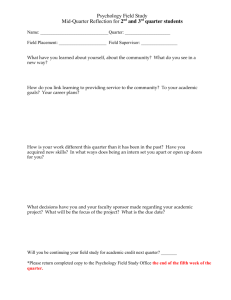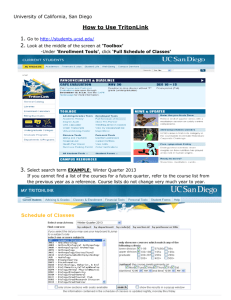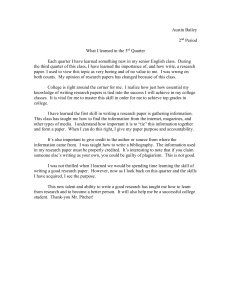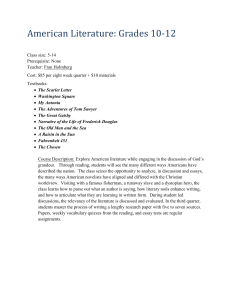Grade 6 Collaboration Meeting-February 27 2013
advertisement
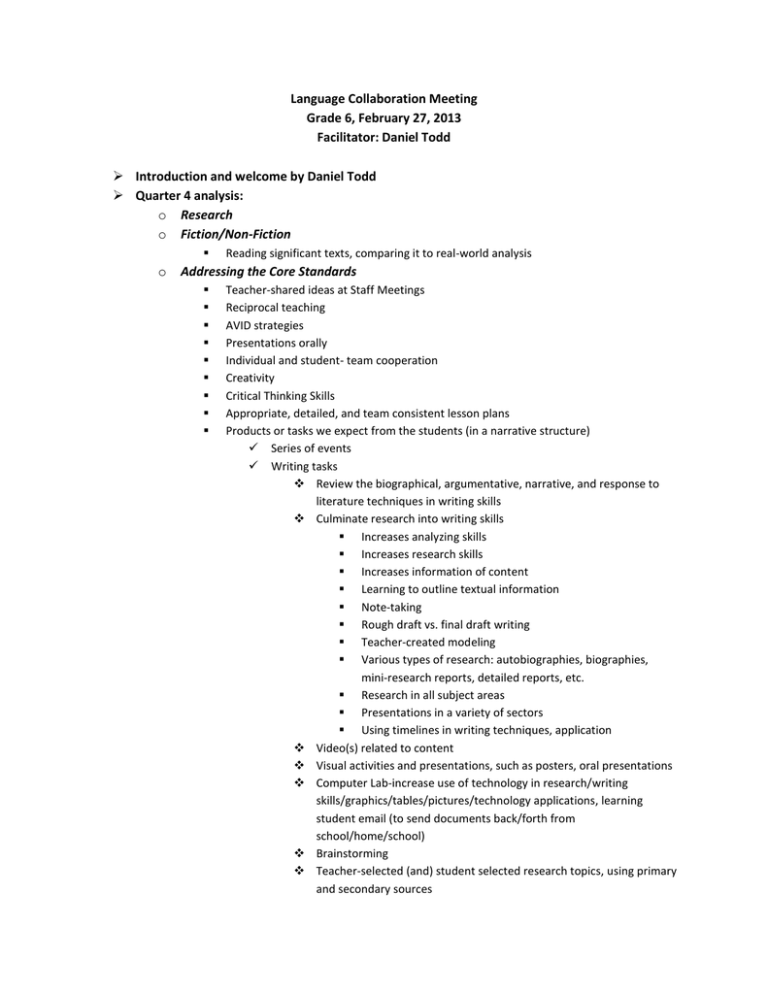
Language Collaboration Meeting Grade 6, February 27, 2013 Facilitator: Daniel Todd Introduction and welcome by Daniel Todd Quarter 4 analysis: o Research o Fiction/Non-Fiction o Reading significant texts, comparing it to real-world analysis Addressing the Core Standards Teacher-shared ideas at Staff Meetings Reciprocal teaching AVID strategies Presentations orally Individual and student- team cooperation Creativity Critical Thinking Skills Appropriate, detailed, and team consistent lesson plans Products or tasks we expect from the students (in a narrative structure) Series of events Writing tasks Review the biographical, argumentative, narrative, and response to literature techniques in writing skills Culminate research into writing skills Increases analyzing skills Increases research skills Increases information of content Learning to outline textual information Note-taking Rough draft vs. final draft writing Teacher-created modeling Various types of research: autobiographies, biographies, mini-research reports, detailed reports, etc. Research in all subject areas Presentations in a variety of sectors Using timelines in writing techniques, application Video(s) related to content Visual activities and presentations, such as posters, oral presentations Computer Lab-increase use of technology in research/writing skills/graphics/tables/pictures/technology applications, learning student email (to send documents back/forth from school/home/school) Brainstorming Teacher-selected (and) student selected research topics, using primary and secondary sources Grade 6 Quarter 4 Instructional Outline o o o o o o o o Concentration on research skills/techniques only (for authentic literacy) Secondary focuses: Grammar skills (with Holt Handbook) Oral skills Social Studies NO writing prompt for Quarter 4 ERWC-Expository Reading and Writing Course (high school doing this course/modules now, coming to middle school implementation next year (possibly) Open-ended : student choice Interviewing a family member Biographical/Historical figure Outline planning guide (such as Dr. Harper’s example shared) for research planning: Model Research Project (teacher models w/help from the class) Time (class periods): 4-5 weeks (25 class periods) Collaboration and brainstorming Learning research writing styles Researching information Finding sources Use of technology Visuals/graphics Presentations Research information/outline: L/A Text, Page 578 (Writing a Report) Intertwined: modeling along the way Pre-selected teacher research for students to do research on Essential Question Selection of topic Guiding question Background/historical information Details that target the topic Problems solving of topic Sample questions: Which leader from ancient history did the most to advance the cause of civil rights? How did _______change the course of history? Explain: We’re looking at the way something in the past changed history, including the way we live today? Possible topics: Biographies of historical figures/personality types Comparison analysis of a past vs. present event/figure Middle School Question/Analysis/Planning Guide o o o o o o o o o o o Is the Common Core going to create ‘better’ students, if so-how? If not-why? Why do certain students score higher than others on standardized tests such as the CST? What is the biggest difference between current assessments and the Smarter Balanced Assessment Consortium’s (Common Core) assessment? What are the big changes you foresee for your classroom? What pedagogical shifts are you interested in exploring during Quarter 4 and throughout the next school year to prepare for the ‘new standards’? Accelerator Reading Program (AR) a good intervention program (our site already has the materials for this program)-or- similar intervention programs Are Student Intervention programs (more) effective/successful than RTI/Teacher Intervention classes? The Common Core Assessment is a huge reason to change what we’re doing Increase reading of informational text Text complexity Academic Vocabulary-strategic comprehensive/vocabulary skills Objective ‘wall’ for Quarter objectives for consistent use in class instruction and reference Text-based answers-rich/rigorous conversations dependent on central text Increase Writing from Sources Selected response (m/c, computer adapted, etc.) (New) Common Core Assessment – starts in 2014-2015 Constructed response tasks/applications-responding to a given question(s) Performance Tasks – assignment w/reading, video/chart, answer and analyze in essay form WHOLE DAY Grade-Level planning days EACH quarter Parent Education Programs (at site) – in English/Literacy instruction, Grade-level Parent Meetings, Quarter Syllabus for each grade-level of curriculum being taught Student Analysis during instruction o o o o o Limited teacher discussion/direction to whole class Student intervention in small groups, independently collaborating topic/instruction guidelines Inquiry-based by students often in instruction Peer to peer interaction, planning and discussion Fun, engaging student activities that ‘are’ part of authentic learning Common Core alignment Using who, what, when, where, and why? Methodology in critical thinking/analysis skills Students read, discuss and write in every class/subject area (including electives) What practices/skills and concepts from the academic year (and year’s past) do you believe have best prepared our students to perform research? What (realistically) should our students know and be able to do by the end of Quarter 4? Plug and Play Framework- /Mock Instruction Practice (team) – Story: ‘Joyas Voladoras’, by Brian Doyle o o Close reading-sustained interpretation of a brief passage of text, using diction(word use) and syntax(word order) Teacher-introduction/presentation of story (or) unit being done Pre-reading questions Discussed in small groups (partners or table groups) Oral sharing with entire class o Include any class comments in entire class sharing Oral reading of story (teacher-read) Brainstorm special/important ideas/feelings/images from text (quiet quickwrite) Initial Response Partner/small group discussion of story/brainstorming Response frames – oral discussion of ideas from small group shared o Literal to figurative – actual ideas to personal feelings List ideas visually as shared Discuss particular vocabulary/meaning/context Re-read and annotate the text Important words/ideas/images underlined/highlighted Circle difficult words, phrases or ideas Asterisks next to places to revisit/discuss Create a T-chart/Poster of text literacy/vocabulary and related discussion/explanations o Partner/small group discussion o T-Chart/Poster completion by each partner/small group Dividing Up the Text 3-5 minute discussions Dividing up the sections/paragraphs by theme? Tone? Message? o Partner/small group discussion/document o Identify key elements of text Thesis Statement (interpretation/opinion) Author’s primary purpose for writing this text? o Teacher model (written response) o Partner model (written response) o Individual response (written response) Textual Evidence/Support (actual evidence) Written account of evidence that is ‘actual’ about the text 2-Paragraph Response Writer’s purpose (and) personal valid opinion Evidence to support your interpretation Images/literal/figurative uses in text used? Online Language sites: (Stories, Writing Activities) Writing.com o Stories for warm-ups, sharing, brainstorming readworks.org o Non-fictional passages

